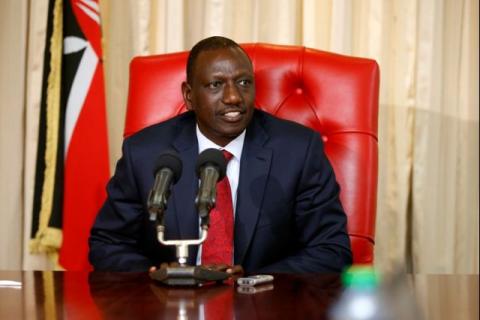Advertisement
Kenya's Odinga pulled out of election to avoid defeat: deputy president
NAIROBI (Reuters) - Kenya's opposition leader Raila Odinga decided not to stand in next week's presidential election to avoid defeat rather than for reasons of principle, the deputy president said on Tuesday.
Odinga was due to face President Uhuru Kenyatta on Oct. 26 in a repeat of a presidential vote held in August but he withdrew his candidacy, saying the electoral commission had failed to institute reforms to guarantee fairness.
Kenyatta won the Aug. 8 election by 1.4 million votes. The Supreme Court annulled the election citing procedural irregularities and ordered that it be held again.
"Odinga is running away from a humiliating defeat," deputy president William Ruto told journalists. "He has to find this excuse and that excuse and the other excuse to try and justify his exit."
He said the government wants Odinga to run but could not force him. "Legitimacy is a matter that concerns us and it concerns us because we believe in a democracy," he said.
The ruling party is confident Kenyatta can win and secure a second and final four-year term in office, Ruto said, citing their majority in parliament and regional governorships.
Political turmoil connected to the elections has hurt Kenya's economy. The country has East Africa's richest economy and is a stable Western ally in a tumultuous region.
Odinga says the election board has failed to meet conditions to guarantee fairness, including firing key personnel he blamed for mistakes during the last poll. Ruto said the board could agree to Odinga's demands as long as the election went ahead.
On Sunday, the board ran adverts in national newspapers showing which demands it had agreed to and why others were rejected. It has agreed to more than half of opposition demands and says it cannot agree to others due to time constraints.
Odinga has called for daily protests to force the reforms. His supporters have defied a ban by authorities on protests in the center of Nairobi, as well as in the port city of Mombasa and the western city of Kisumu, which is Odinga's stronghold.
On Tuesday Odinga blamed police and ruling party supporters for disrupting a planned rally in central Kenya and told reporters that he was planning to travel around the country to direct protests in the coming days.
"We as NASA are very clear about what we want. We said we don't want to go for an election without proper reforms. We don't want to escort Jubilee to the altar," he said. "If Jubilee wants, to have a proper contest, they will have it."
PROTESTS AND POLICE
Ruto said the protests were an attempt to create crisis and encourage international mediation that might lead to a power-sharing government, as happened in the wake of civil disturbances after an election in 2007 in which hundreds died.
Amnesty International and Human Rights Watch said on Monday at least 33 people were killed in Nairobi during a police crackdown on opposition supporters after the August vote. The police said the report was "based on falsehoods."
The opposition said in a statement it was disturbed by the death on Monday of a high school student in the western city of Kisumu, Odinga's stronghold. The security forces were trying to "subdue" people seeking a fair election, it said.
Local police said a young man was killed by a bullet in unclear circumstances.
Also in Kisumu, a two-year-old girl was hospitalized on Monday and had a bullet removed from her neck, doctors at the city's main hospital said.
The girl was playing outside her home when she was struck with a stray bullet, her mother Lydia Kageha told Reuters. She said she could hear teargas canisters and gunshots in a nearby neighborhood where police and protesters had clashed.
Police said they were investigating.
A police spokesman said election board officials were attacked by "hooligans" in several towns in western Kenya on Tuesday and warned against interference with the board's work.
(Additional reporting by Humphrey Malalo, George Obulutsa and Maggie Fick; Editing by Matthew Mpoke Bigg)



















Add new comment